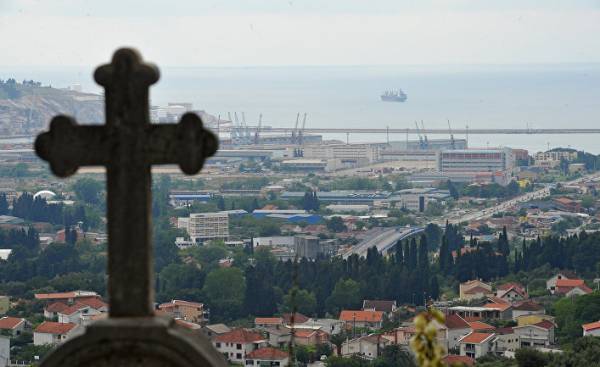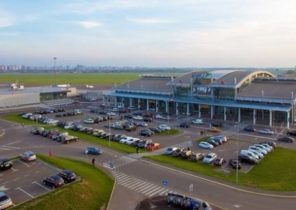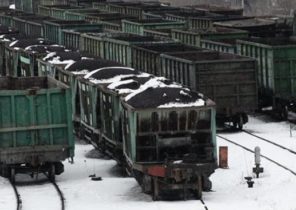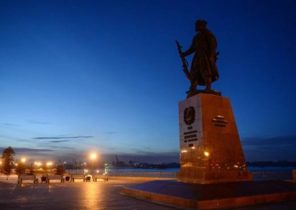
Of the four thousand Europeans have joined the so-called “Islamic State” or ISIS (banned in Russia as a terrorist organization — approx. ed.), 900 (about a quarter) are from the Western Balkans (Albania, Bosnia and Herzegovina, Kosovo and Macedonia). This means that in these four States per capita has more than just fighters. Until recently torn apart by ethnic hatred, today the Western Balkans are faced with a new enemy — jihadism, which can be extremely dangerous for the fragile, yet not gained their final shape democracies.
To understand social changes in the Western Balkans, should carefully examine the role played by LIH in the region. First, however, it is worth noting that the name “Western Balkans” can lead the reader astray. It refers to a geographic region, but does not imply a uniform degree of radicalization and the emergence in it of the militants — although in different countries, this process has some similarities in each case it depends on specific context. Thus, if you examine each country individually, you can much better understand what is happening.
Albania
The removal of the Communists from the government in Albania has led to the violation of political, ideological, economic and social balance. In the 1990s, was born of the radical group, only formally related to Islam. In fact, their justification of violence used by them in common with those of the groups of Communists in the early 20th century. Estimated to LIH joined the order of 90 Albanians, many of whom were killed or went missing. The Albanian press has already published the names of 30 of them.
What led to the spread of radical Islam in society, has always been characterized by religious tolerance? According to Illy Gure (Ylli Gurra), the representative of the Islamic community of Albania and the influential mufti of Tirana, the roots of this process should be sought in perenosnom the period following the departure of the Communists, which was not only political but also religious in nature. Albanian Islam has been vulnerable, after most of the old Islamic clerics died, not finding the heirs. The resulting spiritual emptiness have used foreign forces, among which were Saudi Arabian organization, engaged in education of young Albanian Muslims in the spirit of Wahhabism.
Thus, the radicalization caused not so much religion in itself, but such social phenomena as fragmentation of society, lack of attention to these alarming processes of the state and the poor performance of the security services. Probably, the role played by economic motives — payment of debts, support of families of militants and the coverage unaffordable otherwise Trat radical organizations. However, this is only a guess, because today full-fledged research of the motives of the Albanian jihadists was carried out.
For the past two years, ISIS has not joined any one Albanian. Albania became one of the first countries included in the global coalition to fight this terrorist organization. In 2015 was elaborated the national strategy to combat violent extremism, adopted in order to mobilize society and the state. Do not forget about the contribution of the Islamic community. They taught the local imams to better communicate with his flock and entered among the mosques governing bodies, informing the local leaders of the community about the content proiznesennye sermons. However, the ability to de-radicalize returning to the country of soldiers remains in question. Albania has no ready-made strategies or programs for their return to the bosom of society.
Bosnia and Herzegovina
According to official statistics, Bosnia and Herzegovina is one of the main starting points in the region to go to middle East jihadists. Available information indicates the death of 50 of the 200 fighters in Syria Bosniaks. Of 60 returned to Bosnia and Herzegovina militants, and 40 were brought to justice. However, according to researchers from the International centre for the study of radicalism at king’s College London, the true number of Bosnian fighters in the ranks of ISIS is at least 330 people. Presumably, a significant part of the Mujahideen that remained in the country after the Bosnian war, married local women and surroudings family.
According to another study conducted by the Atlantic initiative, in the so-called Caliphate remains about 80 Bosnian children passing at the age of 13-14 years of military training and preparing to join the ranks of ISIS. There is also present approximately 60 Bosnian women. Members of the LIH steel and volunteers from the largest community of Bosniaks USA (St. Louis) — at the moment we know at least six people.
A small Balkan country, which became in the period between 1992 and 1995 in the place of violent ethnic clashes and attracted the attention of all Europe is home to 3.8 million people, of which only half consider themselves Muslims. Thus, the number barely exceeds half a million. Although only four percent of them share the radical worldview, it becomes increasingly clearer that this country becomes a safe haven for militants, strategists and recruiters of ISIS.
This contributed to many circumstances. It is worth noting the existence of a strong organization of jihadists from the time when the Mujahideen from all over the world flocked to the region in the 1990s. In 1992 was formed the so-called “mujahidin battalion”, consisting of operating in Central Bosnia, Arab volunteers and later turned into the “mujahidin brigade”, numbering fifteen hundred people after replenishment of local militants. At the same time, trade arms in this small country is almost completely out of control. Anyone can buy weapons for a relatively modest sum. There is another reason why Bosnia is important for LIH: it provides many well-trained soldiers, deprived of work and money, ideological or mixed reasons — to join the ranks of the organization.
Despite the statement of the Bosnian government’s control over the situation, there are new reports of so-called “Sharia villages” where people practice polygamy in accordance with the laws of Islam, and in public areas openly posted by the symbols of ISIS, in violation of the law. Do not forget that the money of Islamic charitable organizations, the local population buys a property in remote locations rarely visited by outsiders. There is a suspicion that it is in such places the jihadists carried out the illegal activity, possession of weapons, combat training and assistance in the suppression of borders within the Schengen area. Police supervision of such a “closed to outsiders” property is difficult because of the administrative structure of Bosnia, composed of many independent regions, each of which requires specific police procedures.
The roots of the jihadist movement in Bosnia
Connected with the success of the jihadists in Bosnia macroeconomic factors such as unemployment, reaching among young people 63% and 27% in the General population, and the General economic difficulties and the memory of sharp inter-ethnic clashes in the past? The estimated positive response requires real evidence, but without evident existence of closed communities, cut off from the Bosnian state and the wider society.
“We are talking about villages where there are no more children go to state schools, preferring private education in accordance with the Jordanian program, recently told Galanin Igor (Igor Golijanin), security officer in Sarajevo. — We are talking about violent people, ispolzuya video games to exchange secret messages. We are talking about the cover: earlier camps for combat training that you can identify, today they operate under the guise of private organizations”.
According to the latest statistics, at the end of 2016 in Bosnia, there were 64 of these radicalized communities. Many believe that the development of modern jihadism events that occurred in Bosnia in the 1990s became a turning point. In Afghanistan, the US and the Mujahideen was a common enemy — the Soviet Union, and by accident, they became allies. Nevertheless, it is Bosnia, especially after the crimes committed by the Serbs, have joined jihadists from around the world — the latter was supported by such rich countries as Saudi Arabia and Iran. In Bosnia they faced West and gave rise to the ideology of modern Jihad — the idea of confrontation between Islam and Western hegemony.
Many analysts blame for this situation on the Dayton agreement, forgetting that it sought to end the bloodshed to a greater extent than to establish a able to resist radical Islam in the country. In our day Bosnia and Herzegovina regularly becomes a victim of terrorist attacks. This led to the popular belief that Bosnia could become a European platform for ISIL militants, especially after a series of military defeats, which the group has undergone in Syria and Iraq. Indication of its growing interest in Bosnia can serve as a publication issued by the Caliphate of the quarterly journal “Rome” (which will probably send us to the fall of the Roman Empire) in Bosnian language.
According to the Atlantic initiative conducted a study of Bosnian militants IGIL, the most thorough of such studies at the present day, by 2015, they were divided into two groups, relying on different motives: “apparently, there are two key motive related to two generations of volunteers. The first are the former members of the battalion “El-Mujahid”, which operated in Bosnia between 1992 and 1995, or people close to him. The second consists of “re-found” the religion of the Islamists and converts to Islam — mostly late Teens vozrasta. If the first group examines the war in Syria and Iraq as a continuation of Jihad, which ended prematurely in their view in 1995 after the Dayton agreement, people are looking for thrills and seek to find themselves, build self-esteem and a sense of belonging to something bigger”.
This, according to the study authors, adds decomposition of socio-cultural norms, characteristic of the post-war Bosnian society, where aggressive ideologies were often perceived by the population as the only source of security and self-esteem. The authorities are making significant efforts to combat radicalization and the threat posed by returning from the hot spots jihadists — the latter carrying with him a radical Islamist ideology and undermine national security.
To adequately meet these threats, in 2014, the Parliament passed a law severely punishes (with imprisonment up to ten years) for participation in terrorist groups outside the country or recruitment to such. In April 2015 according to this law four persons were convicted. At the meeting in Banja Luka on 12 December 2016, Bosnian and Serbian intelligence agreed to several additional measures: the use of non-governmental organizations to prevent radicalization and explanation of the actions of the militants; as radicalized Islamic communities who enclosed themselves from the Bosnian society; as well as work with prisoners and serving prison time (at the moment there are about 12 people). Official representatives of the Islamic community of Bosnia has repeatedly expressed his sharp rejection of radical Islam and a willingness to assist the authorities in combating it.
Kosovo
Similarly, the situation in Kosovo raises many questions. First, how is it that friendly to the American society rumplestilskin NATO soldiers as liberators in 1999, have generated a number of jihadists per capita? According to statistics provided by the independent analytical center Global Research in late July 2016, the terrorist organization has entered 314 Kosovars, including 38 women (according to some source, 44). At that time, on the border of Kosovo, Albania and Macedonia there were five camps for training militants. A survey conducted in Pristina, the study of the radical reversal in the attitudes of Kosovars due to the generous donations from Saudi Arabia and other conservative monarchies of the Persian Gulf provided not only charitable and religious organizations, and public agencies.
According to McAuley Fatos (Fatos Makolli), the head of the police unit in Kosovo to combat terrorism: “They spread political Islam… they spend a lot of money for its distribution through various programs aimed at vulnerable youth, and they brought a lot of Wahhabi and Salafi literature. They acquainted the people with radical political Islam that led to their radicalization”. Presumably, non-governmental organizations and the private schools recruit future militants in the country with limited recognition among the international community, then send them to training camps under former operatives of the liberation army of Kosovo.
In March 2016 the origin and motives of the militants in Kosovo cleared after deserted the militant ISIS gave officials a number of documents (whose authenticity is questionable). Curious was the presence among these four documents, registration forms, filled arrived to LIH Kosovars. Each of them contained 23 questions, including the selection of future activities of the three options: “fighter”, “bomber” or “fighter does not expect to return home.”
At this stage it is worth noting that women kosovari in the ranks of the LIH differ markedly from their peers in other countries of the Western Balkans. Their average age is 23 years, most of them are not familiar with Islam prior to its entry into the organization led a secular lifestyle; to their radicalization is largely led by local radical leaders and their wives. In the service of ISIS, these women — mostly Kosovo Albanian women — gained notoriety for his brutality and involvement in bloody crimes against the Serbian population. In the service of ISIS, they worked as Internet recruiters or participated in the training camps, as in the case of Shamil Kosowski Tahiri from Mitrovica.
The participation of Kosovars in the Syrian war sheds light on a number of sensitive facts. For example, veterans of the Kosovo liberation Army, receiving a state pension due to the US, the EU and the IMF, are included in the command structure of ISIS. According to Vrajolli Mentor (Mentor Vrajolli) from the Center for security studies Kosovo, Kosovo bovikov motives can change over time. He suggested that the first wave of joining ISIS could be guided not so much radical views as a desire to help his fellow Muslims or simply wrong. As a result of the government’s efforts to combat terrorism, at the moment the police arrested 14 imams and 67 other people, banning 19 Islamic organizations for the spread of hate and recruitment of terrorists.
Macedonia and further
According to information provided by the Ministry of foreign Affairs of Macedonia, by March 2016 in the ranks of ISIS fought about 140 of the Macedonians, of whom 20 died. They belonged to the Albanian minority in the country. In General, they are characterized by low level of religious literacy and poor knowledge of Islam. Among them there are people of different professions, including imams, workers, professional technology and students of Economics. The efforts made by the Macedonian authorities, led to the arrest of many accused of working for ISIS, and a number of sentences imposed at the trial in March 2016.
It would be appropriate to say a few words about the motivation of women from the Western Balkans, the employees of ISIS. Many researchers point to underlying similarities in their motives, which can be divided into three categories: ideological, socio-political and personal. A significant number of women who decided to join the group, he did it under the influence of their husbands, purposely imparted to them a spirit of radical Islam. Socio-political factors are reduced to the subordinate position of women in these societies, the limited access to jobs and their low representation in Islamic communities. Personal motives related to the desire to find a husband, start a family, or with any trauma experienced in the past. Of course, there are some differences. For example, Kosovars actively participate in hostilities, while bosnacki engaged mainly in housework and care of family.
Most likely, in the near future ISIS will lose their held territories under pressure from the international community. However, the war is far from over. The international community has no clear idea about who needs to change the group, and existing alliances too fragile and prone to contradictions. In other words, in the Syrian conflict there are too many actors with conflicting interests. The real danger lies in the margin of this conflict from specific areas and its move to social networks and the Internet environment. If this happens, the ideology of ISIS will outlive its existence as a “state” and the dangers of radicalism in the countries supplying fighters for the Jihad.
The countries of the Western Balkans is to create a deradicalization program and prevent further radicalization. Among its weaknesses include limited resources, excessive focus on international relations and little experience of democratic governance. Among their strength is a long tradition of coexistence between razlichnymi religious communities, which has not yet completely evaporated.
Translated By Kamenom Boundary.
Tatyana Dronzina lecturer of political science at Sofia University in Bulgaria, also read lectures in University of Granada and University Carlos III in Madrid. Among the studied its are the female suicide bombers, Islamic State radicalization and homegrown terrorism. She is the author and co-author of several books and articles on the subject.
Suleiman Flour — doctor of political science at Sofia University named after St. Clement of Ohrid. Among the study topics include traditional and modern ways of settlement of conflicts in the Albanian communities in the Balkans, and the Albanian immigration into an Islamic State.







